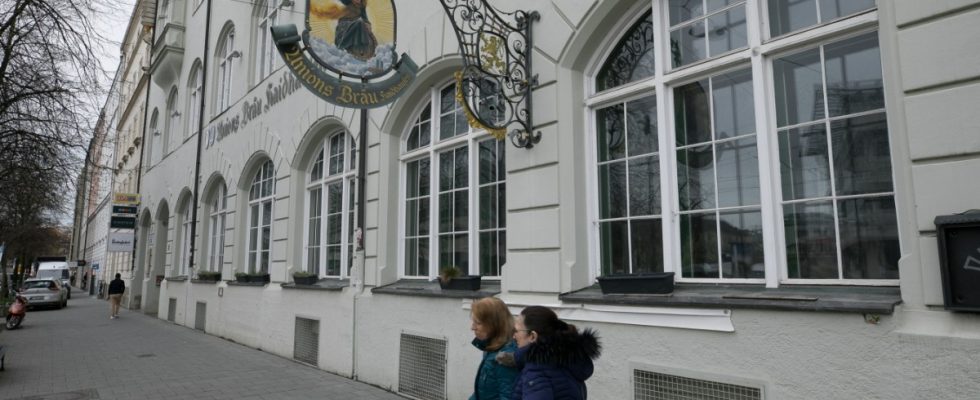A decorative plaque commemorating Josef Schülein hangs on the facade, but next to it there is a desolate sight. The head-high arched windows are broken in several places, advertising flyers are spilling out of the graffiti-smeared mailbox, and the doors and lamps in the glass display case where the menu was supposed to hang have been torn out. Only the golden lion still glitters brilliantly from the metal structure on the wall on which a massive sign hangs. The Munich child can be seen beaming with joy as he waves a beer mug. The lettering also reads: “Unions Bräu Haidhausen.”
But it’s been a long time since laughing people raised their mugs inside the impressive neo-Renaissance building near Max-Weber-Platz. Almost four years ago, landlord Igor Divjak closed the Unionsbräu. As a result, a new operator wanted to open a restaurant in the premises “where Bavaria meets Asia”, as he advertised at the time – and a sign at the entrance still testifies to this today. But that “Restaurant & Sushi Bar Baya” was never supposed to open. Because first came the pandemic, then water damage in the building and finally a year-long legal dispute with the municipal housing association GWG, which is responsible for Unionsbräu.
That dispute in court has now ended. As the city’s municipal department reports, a settlement was agreed to last year. The authority does not provide any details, but the GWG had previously failed with an eviction lawsuit. The municipal department said the tenant returned the rented space in October. This information is astonishing in that, according to its boss Jörg Spengler (Greens), the Au-Haidhausen district committee has since been informed twice by the town hall that the legal dispute is ongoing. In any case, because of the poor condition of the building, “extensive renovation measures” are now necessary, says a spokeswoman for the municipal department. This means: The Unionsbräu cannot be rented out or used for any other purpose in the foreseeable future.
This is the low point of a development that began years ago. The town hall was still so confident when Igor Divjak took over the restaurant in November 2015 after Wiesnwirt Wiggerl Hagn moved out and it was vacant for a long time. They were happy, said the then municipal officer Axel Markwardt, to have found an innkeeper “who has once again made the Unionsbräu an extremely hospitable place for Haidhausen, where everyone from 18 to 80 likes to come together to eat, drink and chat.” But like Hagn, who described the restaurant as a constant loss-making business, Divjak also struggled with the sheer size of the restaurant, which, in addition to the bar, also includes a hall and conference rooms on the first floor and two basements.
A feasibility study is currently underway to realign the areas
The tenant said that he had certainly generated “good sales”. And yet he gave up the Unionsbräu after five years, “because I only had stress and trouble with the city.” The reason for the dispute, which also went to court, was, among other things, the landlord’s plans to establish other uses in the building, such as escape rooms. “You can’t fill an 800-seat venue if you only serve beer,” Divjak said. “Those days are long gone.”
His successor wanted to try a new gastronomic concept – but that didn’t even happen. Instead, there were years of legal battles while the stately building fell increasingly into disrepair. “Continuous water entry over the years has caused damage to the cap ceilings of the historic vaulted cellars,” said the municipal department. In addition, the technical systems were damaged, which is why “a general repair of the entire property” is now required. How long this will take cannot yet be estimated, nor can the costs, according to the authority. The damage is currently being examined; In addition, a feasibility study is underway to “realign the areas”. However, at least some of the rooms should continue to be used for catering in the future.
There will probably be sadness in the Unionsbräu for a long time to come.
(Photo: Florian Peljak)
For the time being, however, there will probably be a long period of sadness in a place that once wrote Munich brewery history. Joseph Schülein acquired the “Fügerbräu” there in 1885 and founded his “Unionsbrauerei Schülein & Companie”. This quickly developed into one of the largest breweries in the city, taking over the Münchner-Kindl brewery in 1905 and merging with the Münchner Aktienbrauerei to form Löwenbräu in 1921. However, as Jews, the company founder and his son Hermann Schülein, who was general director of the company from 1924 onwards, were increasingly attacked by the Nazis, who, among other things, agitated against “Jewish beer”. In 1933 Josef Schülein had to withdraw from the Löwenbräu supervisory board; five years later he died on his Kaltenberg estate.
Meanwhile, the name Unionsbräu only survived in the form of the restaurant in the 130-year-old building.

